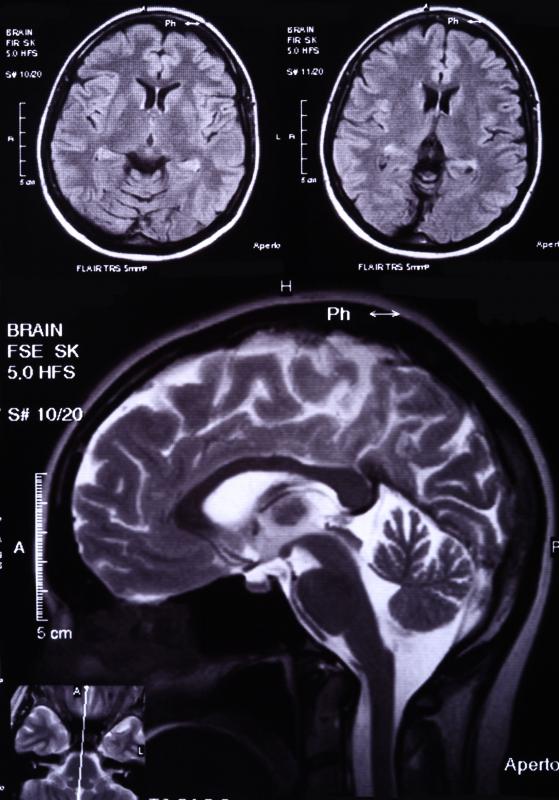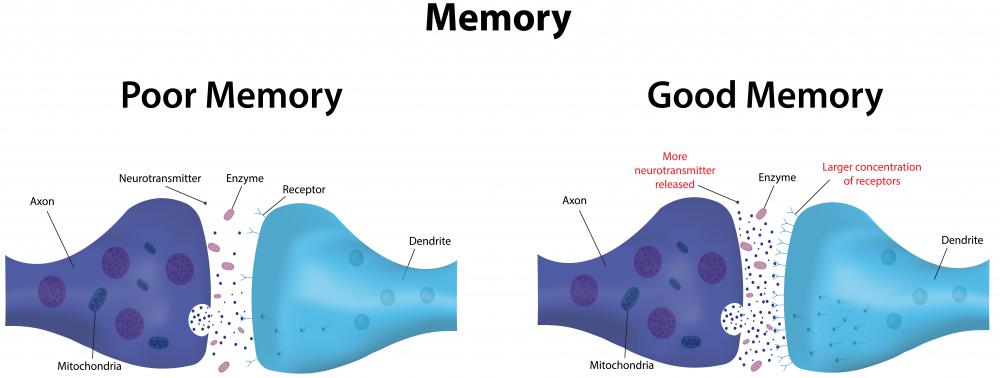At WiseGEEK, we're committed to delivering accurate, trustworthy information. Our expert-authored content is rigorously fact-checked and sourced from credible authorities. Discover how we uphold the highest standards in providing you with reliable knowledge.
What Is Cholinesterase?
Cholinesterase is a type of enzyme responsible for the breakdown of acetylcholine (ACh) into choline and acetic acid by splitting water molecules into hydrogen ions. Thus, it acts as a chemical catalyst. Cholinesterase conducts this process, known as hydrolysis, between nerve cells in the brain. ACh is a neurotransmitter that contributes to neurological functions such as memory and muscle control.
The resulting products of cholinesterase’s inactivation of acetylcholine, choline and acetic acid have their purposes. Choline is a water-soluble essential nutrient best known for the prevention of fat accumulation in the liver, although it also contributes to the prevention of heart disease and certain cancers. Acetic acid is a colorless liquid that gives vinegar its taste and smell, and it is used extensively for food preservation.

There are two types of cholinesterase: acetylcholinesterase (AChE), which is formally known as acetylcholine acetylhydrolase and is also known as red blood cell (RBC) cholinesterase and erythrocyte cholinesterase; and pseudocholinesterase (BChE or BuChE), which is officially known as acylcholine acylhydrolase and is also referred to as plasma cholinesterase and butyrylcholinesterase. AChE is primarily known for hydrolyzing ACh, and its main site is the blood. BChE, which is usually found in the liver, also hydrolyzes ACh, but at a slower rate. It processes the ACh-like molecule butyrylcholine faster than AChE, though.

An absence of BChE in particular causes pseudocholinesterase deficiency. This is an abnormality that is characterized by sensitivity to some anesthetic drugs during surgery. Pseudocholinesterase deficiency, however, is triggered only when the patient takes anesthetics, which include muscle relaxants such as succinylcholine—trade names Anectine, Quelicin and Scoline—and mivacurium.

The inactivation or inhibition of ACh by cholinesterase has led some members of the medical community to attribute the development of certain diseases to such a deficiency. A prime example is Alzheimer's disease, an incurable degenerative disease that lists loss of long-term memory among its characteristics. The oldest hypothesis concerning the cause of Alzheimer’s is the cholinergic hypothesis, which contends that reduction of the ACh neurotransmitter is responsible for the disease. It is, however, not a very popular theory, due to the general inefficiency of acetylcholine-based treatments.

Still, cholinesterase inhibitors, nicknamed “anticholinesterase,” exist in the pharmaceutical market to prevent the enzyme for breaking down ACh. Apart from combating Alzheimer’s and other types of dementia, they have been used for treating myasthenia gravis, which is a neuromuscular disease; and glaucoma, which is an eye disorder characterized by optic nerve damage. Edrophonium is the cholinesterase inhibitor used for myasthenia gravis, while Dyflos and Ecothiopate are applied to glaucoma.
AS FEATURED ON:
AS FEATURED ON:














Discuss this Article
Post your comments